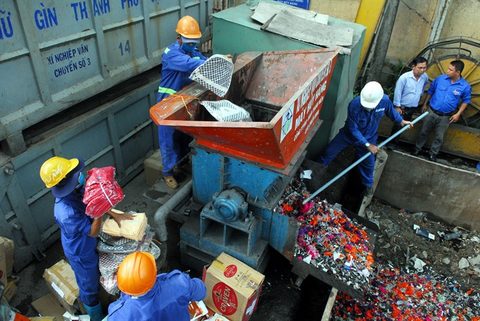IP rights violations alarm agencies
 |
| HCM City authority destroys counterfeit products. - VNA/VNS Photo Manh Linh |
During a Wednesday forum in HCM City on the food sector’s protection of IP rights, the HCM City Market Watch reported a rising trend in the production, commercialisation and consumption of counterfeit goods, especially in the food and processed food sector.
The authority also commented that the technology and production scale of counterfeit goods are also increasing, with just about every popular food product being copied by a horde of cheap knockoffs and blatant infringements of the original’s trademark.
In recent years, with more free trade agreements signed by Viet Nam, domestic producers are facing an increasing number of IP infringements, with some serious cases involving household names such as Phu Quoc fish sauce or Trung Nguyen Coffee.
The authority believes the problem must be stopped at its roots, by encouraging consumers to boycott the use of counterfeit goods and increasing the severity of punishments for knockoffs producers.
Ly Kim Chi, chairwoman of the Food and Foodstuff Association of HCM City (FFA), stressed that there must be unanimous implementation of multiple solutions from both firms and market control authorities.
This means firms should invest in better, more up to date production technology and branding processes, while market control agencies must look for counterfeit goods more actively.
Chi advised firms to register their trademarks for optimal IP rights protection, which should include their trademarks, copyright, patents, industrial design rights, and even trade secrets. Firms would also benefit from complying with regulations on certificates of origin, such as barcode registration, and plan a long term IP protection strategy.
Phan Hoan Kiem, deputy head of the HCM City Department of Industry and Trade (DIT), said he believed the only way to fully deal with counterfeiting is for authorities, firms and consumers to work together.
Food for thought
Nguyen Thanh Phuong, a representative from the HCM City Market Watch, said that not only are counterfeit goods produced by domestic units, but they are also imported from foreign makers through illegal routes.
He noted that domestically produced knockoffs are made in parts by different people in different places and packaged in yet another place, making it hard for authorities to trace their origin.
Phuong explained that counterfeit food production begins once producers receive an order from a chief distributor, after which the imitation trademark and origin certificate are applied onto the products.
The final knockoffs are delivered to sellers or users without any inventory outstanding for the producers, out of fear that authorities will conduct inspections and discover the fraud. The same process applies for foreign counterfeit food, though Phuong noted that besides illegal trade routes, these goods can enter Viet Nam through borders gate as well.
Other experts at the forum said that the level of complexity in the technology used to produce these counterfeit goods is so great that even the authorities would struggle to tell the original and the knockoffs apart. Only certified original producers could use their own trade secrets to discover the imitation and confirm IP rights infringements.
Experts also said that counterfeit goods workshops tend to either be in densely populated areas or remote suburban regions, with the locations changing regularly to avoid inspections.
Currently, there are a multitude of knockoffs being sold in the country, including not only popular food products, but also household goods, electronics, clothes, makeup, pharmacies, construction materials, automobile spare parts and telecommunication devices.
According to Kiem, exposing knockoff production rings has been difficult for authorities, and he predicted the challenges to increase, unless firms and consumers also take action.
In the first six months of 2017, 310 cases of counterfeit production were exposed, while 2016 saw 1,653 cases with total fines of nearly VND17 billion (US$757,238).
The forum was organised by the DIT and the FFA, focusing on eliminating counterfeit production and raising awareness of the importance of IP rights protection.
What the stars mean:
★ Poor ★ ★ Promising ★★★ Good ★★★★ Very good ★★★★★ Exceptional
Latest News
More News
- State corporations poised to drive 2026 growth (February 03, 2026 | 13:58)
- Why high-tech talent will define Vietnam’s growth (February 02, 2026 | 10:47)
- FMCG resilience amid varying storms (February 02, 2026 | 10:00)
- Customs reforms strengthen business confidence, support trade growth (February 01, 2026 | 08:20)
- Vietnam and US to launch sixth trade negotiation round (January 30, 2026 | 15:19)
- Digital publishing emerges as key growth driver in Vietnam (January 30, 2026 | 10:59)
- EVN signs key contract for Tri An hydropower expansion (January 30, 2026 | 10:57)
- Vietnam to lead trade growth in ASEAN (January 29, 2026 | 15:08)
- Carlsberg Vietnam delivers Lunar New Year support in central region (January 28, 2026 | 17:19)
- TikTok penalised $35,000 in Vietnam for consumer protection violations (January 28, 2026 | 17:15)
















 Mobile Version
Mobile Version